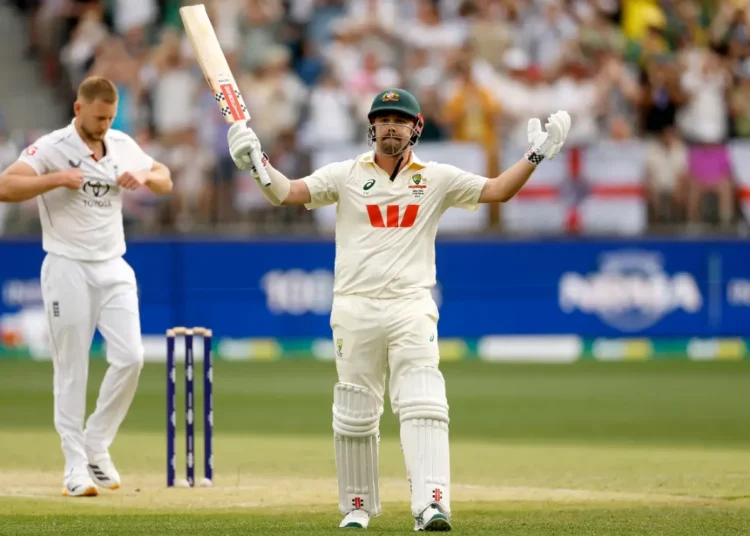Australia’s preparations for the second Ashes Test have taken an unexpected turn, with veteran opener Usman Khawaja undergoing further assessment for a back spasm that forced him to miss his opening duties in Perth. Head coach Andrew McDonald confirmed that Cricket Australia’s medical team will investigate the issue thoroughly ahead of the Brisbane Test, describing the situation as “unusual” given Khawaja’s long, injury-free career.
Khawaja, 38, struggled with discomfort throughout the Perth Test, batting only once and visibly labouring in the field. His condition became a major talking point after he dropped a catch at slip and later left the ground. The timing of the injury has naturally raised questions, but McDonald was quick to dismiss speculation that age was a contributing factor.
“These things can happen,” he said. “You can’t simply join the dots to age. It’s something he hasn’t dealt with before, so we just need to investigate it properly.”
Reports confirmed that Khawaja had played three consecutive rounds of golf — 54 holes — ahead of the match, something he has done in previous Tests without issue. McDonald reiterated that the golfing workload was not considered a cause, but the team will still conduct “due diligence” to rule out anything more serious.
Head’s Heroics Spark Batting Order Debate
While Khawaja’s injury created immediate uncertainty, Travis Head’s explosive 123 off just 83 balls in the second innings has opened up a broader discussion about Australia’s batting structure. Head, stepping in as a temporary opener due to Khawaja’s absence, produced one of the most astonishing Ashes innings of the modern era — a 69-ball hundred that transformed a tense contest into a two-day victory.
Head’s impact has inevitably triggered debate about whether Australia should consider a long-term shift. McDonald acknowledged that the selectors now face a significant decision, though he stressed that the coaching group will not rush into conclusions based on a single innings.
“Batting orders are always heavily debated,” he said. “Middle-order players haven’t traditionally been moved up, but performances like this do open up conversations. We’ve discussed flexibility in the past, particularly in second innings when quick runs are needed. This situation, though triggered by injury, gives us more to think about.”
While there is excitement around Head’s success at the top, McDonald reminded that selectors have historically been cautious. Steven Smith’s brief experiment as opener — including an unbeaten 91 — was abandoned after a dip in form. Head’s own track record, including his match-winning pink-ball century from No. 5 in Adelaide last year, will also weigh heavily in discussions.
Flexibility May Be Australia’s New Weapon
One theme McDonald emphasised was adaptability. Australia, he revealed, have long explored the idea of elevating a middle-order batter temporarily if conditions flatten out or match situations demand quick scoring. Head’s century provided the clearest real-time example of this strategy succeeding.
“We’ve talked about it for a long time,” McDonald said. “If the pitch is settling and quick runs are needed, someone like Travis can change the tempo immediately. We’ve always viewed that as a tactical option, and now that it’s played out in a real match, the conversation naturally grows.”
Head himself has been open about his willingness to move around the order if required. While Australia may not commit to a permanent change before Brisbane, the coaching staff now have a clearer understanding of what a flexible, situation-based batting order could offer.
Khawaja’s Fitness Now Sets the Tone for Selection
Ultimately, Australia’s decisions for the Brisbane Test may hinge on Khawaja’s medical results. The coaching staff will reconvene in six days, and McDonald expects more clarity by then. His instinct is that the injury “should be okay,” but he acknowledged that spasms generally indicate an underlying issue that needs evaluation — especially when it appears for the first time in an athlete with a long career.
Australia dominated the first Test with minimal resistance from England, but McDonald remains focused on stability rather than radical changes. The selectors will balance form, fitness, conditions, and long-term planning as they shape the XI for Brisbane.
Whether Head stays in the middle order or receives another chance to open will likely depend on Khawaja’s availability. Until then, Australia’s remarkable two-day win has provided as many questions as answers — and a rare opportunity to experiment with a batting blueprint that could shape the series ahead.



